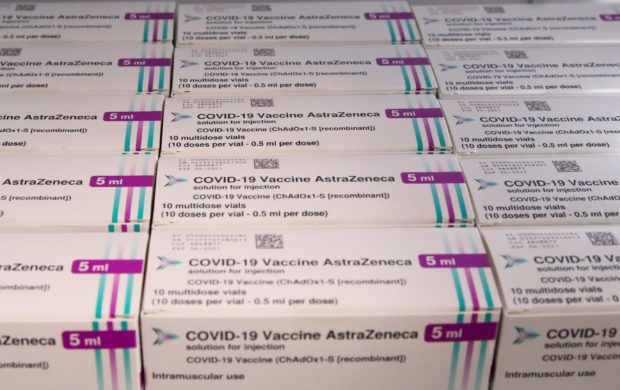Unwanted vaccines needed to help poor countries catch up, international health officials say

FILE PHOTO: Boxes of AstraZeneca COVID-19 vaccine are seen at a vaccination center, amid the coronavirus disease outbreak, in Ronquieres, Belgium April 6, 2021. REUTERS/Yves Herman
Doses of vaccines rejected as countries fine-tune their inoculation campaigns will go to poor countries where possible to counter a “shocking imbalance” in distribution, international health officials said on Friday.
Authorities in Australia and Greece became the latest to recommend alternatives to the AstraZeneca vaccine for younger people over fears of possible very rare blood clots, while Hong Kong delayed deliveries, saying it had enough alternatives and did not want to waste these shots while global supplies were short.
Australia’s decision effectively put paid to plans to have its population vaccinated by the end of October, highlighting the delicate public health balancing act the issue has created.
Giving alternative vaccines to younger recipients will delay inoculation campaigns by around a month in Australia, France and Britain, science information and analytics company Airfinity forecast after crunching the numbers for those countries.
Millions of doses of the AstraZeneca shot have been safely administered around the world but some governments have limited its use to older age groups as a precaution while cases of clotting are investigated.
The World Health Organization said most countries did not have anywhere near enough shots of any vaccine to cover health workers and others at high risk from exposure to the virus, which has killed almost 3 million people around the world.
WHO Director-General Tedros Adhanom Ghebreyesus said high income countries had on average vaccinated one in four people while in low income countries it was one in more than 500.
“There remains a shocking imbalance in the distribution of vaccines,” he told a press briefing on Friday.
The WHO and GAVI vaccine alliance’s COVAX mechanism aims to ensure vaccines reach poorer states. Asked whether COVAX was negotiating for doses of the AstraZeneca vaccine that had been shunned, GAVI alliance head Seth Berkley said the Anglo-Swedish company’s supply chain had “picked up”.
“As countries decide they are going to prioritize one vaccine or another, that may free up doses, and in so doing we will try to make sure those doses are made available without delay, if countries are willing to make that happen,” he said.
Differing age limits
Australia said it had doubled its order of the Pfizer shot after health authorities recommended those under 50 take it instead of AstraZeneca. Greece followed Britain in recommending people under 30 get an alternative shot.
AstraZeneca said it was working with regulators “to understand the individual cases, epidemiology and possible mechanisms that could explain these extremely rare events”.
The European Medicines Agency (EMA) received reports of 169 cases of the rare brain blood clot by early April, after 34 million doses had been administered, Sabine Straus, chair of the EMA’s safety committee, said this week.
Most of the cases reported had occurred in women under 60.
On Friday, the EMA said that if a causal relationship is confirmed or considered likely, regulatory action will be needed to minimize risk.
It also said it was looking into Johnson & Johnson’s (J&J) shot over reports of blood clots. U.S. infectious disease expert Anthony Fauci said there was nothing on reports on the J&J vaccine that is a red flag.
The AstraZeneca shot is by far the cheapest and most high-volume vaccine launched so far to curb the pandemic and avert damaging lockdowns, but supplies have been beset by delays.
However, new data in the EU, where vaccinations lag those in the United States, showed overall deliveries of vaccines were gathering momentum. Germany said it was accelerating inoculations but needed a new lockdown as well.
“Every day in which we don’t act, we lose lives,” Lothar Wieler, president of the Robert Koch Institute, said.
Global supply
Hong Kong Health Secretary Sophia Chan said the city would delay its ordered shipments of the AstraZeneca vaccine this year “so as not to cause a waste when the vaccine is still in short supply globally”.
The government was considering buying a new type of vaccine that may offer better protection, she added.
All the countries recommending age limits for the AstraZeneca shot have emphasized that its benefits far outweigh the risks of catching COVID-19 for older people.
But some people have been put off. Madrid said less than half of over 60s due to have the AstraZeneca shot on Thursday turned up, a day after Spain recommended younger people get a different shot.
The top health body in France, where vaccine hesitancy is high, recommended that those over 55 who had received a first dose of the AstraZeneca shot get a new-style messenger-RNA vaccine for the second one.
Two messenger RNA vaccines have been approved for use in France, one from Pfizer and BioNTech and another from Moderna.